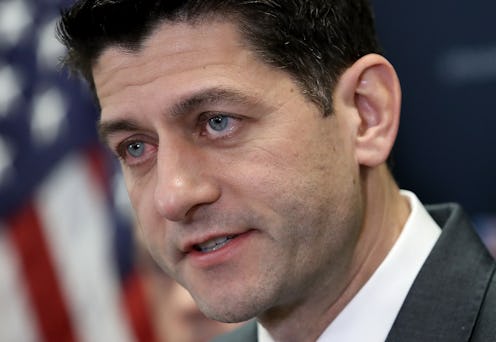News
Paul Ryan's Parenting Comments Aren't What You'd Expect From Him

After announcing Wednesday that he won't seek reelection, Speaker of the House Paul Ryan cited parenting as his reason for walking away from one of the most powerful jobs in the country. The Wisconsin congressman told Politico that he doesn't want to be a "a weekend dad," and expressed regret that his wife has to do the lion's share of the work raising their three teenage children. But to many of those familiar with Ryan's voting record over the years, his concern for the struggles of working families appeared to be a recent development.
"My wife's doing 90 percent of the parenting and I don't want that to happen," Ryan told Politico. "And I basically knew, if I do another two years after this year, they're only going to know me as a weekend dad." He added that he's "always felt like I was running against the hourglass of my kids," the oldest of whom is currently looking at colleges.
To be sure, "I want to spend more time with my family" is a time-honored explanation that politicians use when leaving office, and running the House of Representatives does indeed give Ryan much less time to spend with his kids back in Wisconsin. But as many pointed out, Ryan has consistently opposed family leave for other Americans, and has supported other policies that make the struggles of parenting that much harder for Americans who, unlike him, aren't already multi-millionaires.
In 2009, the House voted on the Federal Employees Paid Parental Leave Act, which would have allowed federal employees to take up to four weeks of paid parental leave after having a child. Ryan voted against it. Six years later, when Democratic Rep. Rose DeLauro introduced a bill to establish a national paid family and medical leave insurance program, Ryan allowed it to die in the committee that he chairs without a vote.
In the last year of his presidency, former President Bill Clinton issued a ruling through the Department of Labor that allowed states, if they so desired, to use unemployment insurance funds to compensate parents who'd taken unpaid time off work to care for a child. Ryan, then a freshman congressman, called the new rule "a shocking agency power grab," arguing that new parents shouldn't be eligible for those funds because they are not "the truly needy."
Moreover, Ryan has supported other policies that, while not specifically focused on family leave, would nonetheless make life harder for millions of parents by choking off their access to affordable health care and redistributing their wealth to the richest Americans. Likewise, he's consistently opposed bills that provide direct assistance to working-class families, including measures that would raise the minimum wage, extend unemployment insurance, and fully fund food stamps programs.
Lastly, a 2015 survey of congressional offices by Huffington Post found that Ryan did not offer paid family leave to his own staffers. Bustle has reached out to his office to determine whether or not this is still the case.
Despite all of this, Ryan has been firm and vocal in his insistence that he himself be afforded enough time to spend with his family.
"I cannot and will not give up my family time," Ryan said shortly before becoming speaker. Around the same time, one of his Republican colleagues quoted him as saying, "I don't want to work weekends" as speaker.
Ryan has made clear, however, that he doesn't see any contradiction between his opposition to paid family leave on the one hand and his demand to spend time with his own family on the other.
"I don't think that sticking up for being a person with balance in your life, for wanting to spend your weekends in your home with your family... I don't think that means signing up for some new unfunded mandate," Ryan told CNN in 2015.